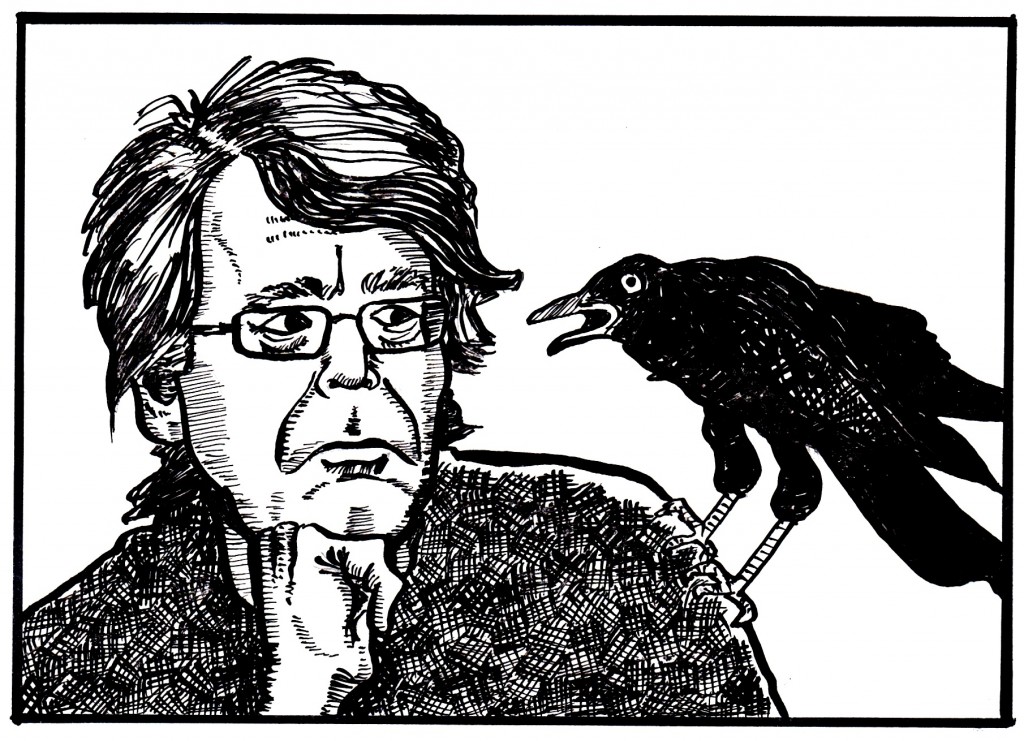
I can DRAW Stephen King, but I want to WRITE like Stephen King.
The seller of 350 million books should know something about writing, so in 2000 Stephen King published his memoir On Writing. Part autobiography, part writing tutorial, On Writing has become every writer’s best friend. You look really busy watching cat videos today, so don’t read his book…here are Stephen King’s main tips for good writing (in bold) with my humble comments underneath:
Use the simplest word.
I have a tendency to show off, slipping in big words so everyone knows I have lots of book learnin’. This is stupid and counter-productive. Never use “supercalifragilisticexpialidocious” when you can say “great.”
Use the word which first comes to mind, if it is appropriate and colourful.
You don’t have to construct elaborate, tortured phrases that take time to decipher and appreciate. For example, it’s a bit contrived, and not necessary to describe a notorious American politician as a “tiny-fingered, Cheeto-faced ferret-wearing shitgibbon.” It’s better to say what you think of, without thinking, like “ignorant blowhard bully.”
Well, you could also say, “racist, sexist block of aged Cheddar.”
Or, “microwaved circus peanut.”
Or, “jack-o-lantern head on a drunken bear.”
Or, “ludicrous tangerine ballbag.”
Or, “mangled apricot hellbeast.”
Actually, those are all pretty good. Forget this rule.
Use active, not passive verbs.
With an active verb, the subject of the sentence is doing something.
As in, “Bill had a vasectomy.”
Passive verbs aren’t as powerful. With a passive verb, something is being done TO the subject of the sentence. As in,
“A vasectomy was performed on Bill, (who endured the humiliating procedure with characteristic calm and good humour).”
The adverb is not your friend. Use sparingly.
Excessive use of adverbs is lazy writing. A poor writer may write, “When Mary’s father FORCEFULLY ENTERED his teenager’s bedroom and AGGRESSIVELY POINTED his shotgun at Mary’s boyfriend, Fred RAN QUICKLY to his car.” It’s better to find more descriptive verbs:
“EXPLODING into his teenager’s bedroom, Mary’s father TERRORIZED Mary’s boyfriend with his shotgun until Fred BOLTED to his car.”
Use “he said” and “she said” in dialogue.
As readers, we should focus on the dialogue, understanding the characters’ feelings through their words. Some writers (formerly, me), try to get cute with their verbal markers, leading to:
“And that’s why the vicar had a budgie,” he CROWED his punchline.
Not only is this verbal attribution trying too hard to be clever, it detracts from the character’s words. It would be better to set the scene like this:
The crowd anticipated the punchline. Jim leapt atop his chair, flung his arms wide, and said, “And that’s why the vicar had a budgie.”
Don’t use adverbs in dialogue attribution.
“You’re an idiot, Billy,” Carol said DISMISSIVELY.
Such dialogue attribution is sometimes called a “Swifty” after Tom Swift, the brave hero of a series of boys’ adventure novels written by Victor Appleton II.
It’s more evocative if you remove the adverb and add action to the scene:
“You’re an idiot, Billy,” said Carol. She rolled her eyes, sighed, and bent over her iPhone to play Words With Friends.
You are allowed to use a Swifty if it’s a parlour game with your pals, as in, “You got a nice butt, lady,” he said CHEEKILY.
Possessives always add ‘s, even if the word ends in s.
If we want to refer to the bottom of the sea, the locker of Davy Jones, we should say, “Davy Jones’s locker.” But that’s only according to Stephen King and the Chicago Manual of Style. The Associated Press style dictates, “Davy Jones’ locker.” No extra “s”. It’s a raging controversy. So Stephen King has only half of the English speaking world on his side with this one.
By the way, “David Jones” is the real name of rocker David Bowie (and also the name of the lead singer of The Monkees). This quirky fact has nothing to do with Stephen King.
Less TV, more reading.
Stephen King’s number one piece of advice to writers is that to be a good writer, you have to read a lot of different writers. And read ALL the time. I think that was my only preparation before I impulsively ditched my legal career to become a professional writer.
I am trying to follow Stephen King’s suggestions in my writing. Obviously, it’s been successful for him. Emulating Stephen King has yet to translate into a publishing deal for me. Maybe all I have to do to entice a publisher is add some telekinesis or a sentient automobile to my book. Best seller!
